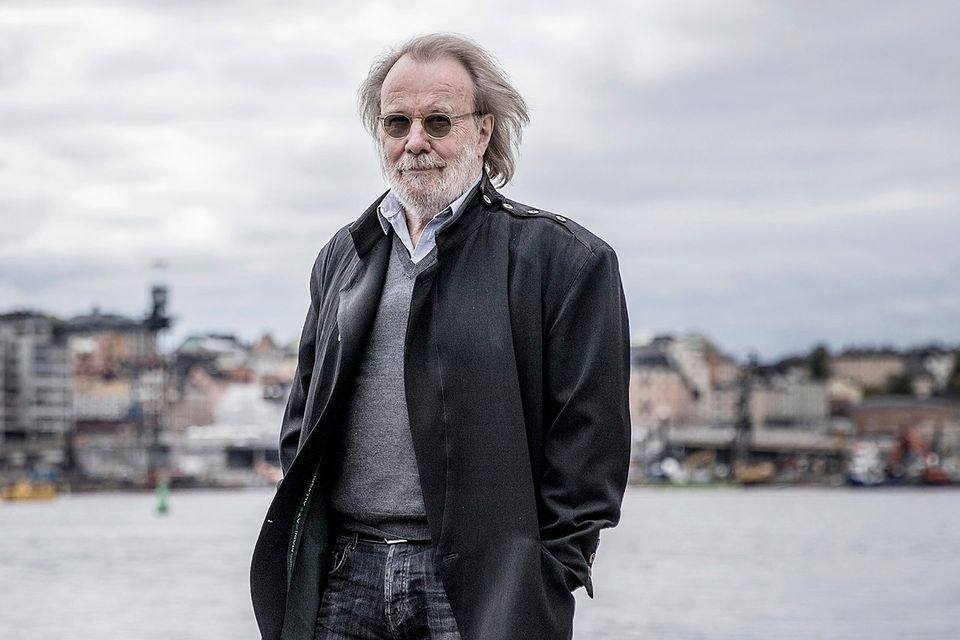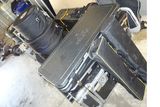ARCHIVE VIDEO: ‘It really annoys me when people say that Pierce Brosnan can’t sing’ - Benny from ABBA
With his solo album, a 'virtual' Abba tour and the sequel to Mamma Mia! all on the go, retirement is a bit of an alien concept to Benny Andersson. Our music critic chats to the Swedish hitmaker
Benny Andersson: Photo by IBL/REX/Shutterstock
I'm a few minutes into my interview with Benny Andersson and he seems like such an agreeable sort that I decide to share with him my very earliest memory.
My mother, I tell him, used to sing Abba songs into a hairbrush. It's one of only two memories this child of 1975 has of that decade - the other is television footage of the Papal visit - but it's an especially vivid one, not least because her love of Andersson's sensationally popular band continued way beyond their demise in the early 1980s.
He is tickled by the story. "Your mother sounds like such a lovely woman," he says. "Abba songs... that's really nice to hear."
It triggers memory of Abba's only show in Ireland - in Dublin's RDS Main Hall on November 15, 1979.
"I remember it well," he says. "We opened with a traditional Swedish folk song because we thought it would connect with the Irish. You love your folk songs and there's that link with us."
There are certainly some connections between Ireland and Scandinavia, I venture. What about all those Viking invaders who terrorised the natives here more than a millennium ago? "Well, yes," he deadpans, "sorry about that."
Andersson has just released a classical music album, Piano, which sees him rework several of Abba's most famous songs - as well as some of his own solo ones. It's been released by the acclaimed classical label Deutsche Grammophon, and he seems genuinely moved by positive reaction.
"To tell you the truth, I'm delighted about it," he says. "People have really responded very kindly to it and I hadn't been sure what the reaction would be. Would they be bored by the idea of an old man playing the piano? It turns out they're not."
His ex-wife and former Abba bandmate Anni-Frid Lyngstad - Frida - has paid her respects: "She told me she likes it."
And the others, songwriting partner Björn Ulvaeus and his ex-wife Agnetha Fältskog? "I haven't heard from the others," he says, "but I really don't care - I'm very pleased with it myself."
He reacts with great enthusiasm when I suggest the album sounds as though he was recorded playing the instrument at his home, purely for his own pleasure.
"That's exactly what I was hoping for," he says. "I didn't want it to feel as though it was this grand thing in a recording studio. I was looking to try to convey that feeling of intimacy and I spoke to Linn [Fijal], who recorded the album with me, about what I was trying to achieve."
He is speaking to Review from Hotel Rival, the Stockholm landmark he owns. He's here a lot, especially now that a follow-up to the movie version of Mamma Mia! is being made, and production crew are milling about. "It's a sequel and also a prequel," he says. "All the cast will be returning and some new people too, of course, to play the characters when they were younger."
Much of Andersson's formidable wealth has been derived from Mamma Mia!, which began life as globe-conquering musical set to Abba songs in 1999. At one point, 18 productions were playing somewhere in the world simultaneously.
But he would have been fantastically wealthy from all those Abba royalties anyway. In 2010, Universal estimated that they sold 350 million singles and albums. They reached huge numbers in the 1970s and their reach continues to this day. "It's the universality of the songs," he says. "People anywhere in the world can relate to them."
He still sets workman-like hours everyday - 10am to 5pm - to sit and write or to devote time to some aspect of his creative legacy.
"Every day, I try to create something."
Much of his time as been devoted to the 'virtual' Abba tour that will take place either next year or in 2019. The idea is real live musicians will play and interact with holograms of Abba from back in their pomp. "I think it will be a fun thing to do," he says, "but there's a lot of work to go."
It's the closest the band will have got to reforming and music industry gossip is rife with tales about the enormous sums of money each of the four were offered to go on the road once more. All overtures were rebuffed.
They never officially split but the collapse of both marriages within the band ensured it was only a matter of time before they went their separate ways. As some critics have pointed out, the chances of Fältskog putting her heart into 'The Winner Takes It All' - co-penned by her ex - was always going to have a limited shelf life.
"But even back in the day we didn't tour that much," he says. "Most of our work was done in the studio." And, as every Abba fan knows, Fältskog hated flying. That unwillingness to tour has been cited as a reason why they were never truly embraced in the US.
And yet there were other countries, like Australia, where they were massively popular - the Australian jaunt of 1977 was made into a cult tour film by future Oscar-nominated director Lasse Hallström. It was Hallström who had cut his teeth making those gloriously kitsch Abba videos.
Andersson is happy to have the music he co-wrote with Ulvaeus live on in musicals and movies, and a new generation will likely get to bask in those famous songs when Mamma Mia!'s next instalment - the plainly titled Here We Go Again - is released next July.
And, speaking of the forthcoming movie, Andersson has something he wishes to get off his chest, now that he is talking to an Irish journalist.
"I've just been to the UK to promote the album," he says, "and it's really annoyed me the way people say Pierce Brosnan can't sing.
"They think it's not possible for James Bond to sing. But he can, and he sings well."
Sure enough, a quick YouTube search shows Andersson barely hiding his irritation when UK morning TV presenters quip about Brosnan's dalliances in song. I don't have the nerve to suggest the Meath man is hardly the world's most gifted vocalist, whatever about his other qualities. In later years, Abba members were not renowned for a willingness to court publicity, although Andersson has always been the one most amenable to the media. It's no coincidence that he's the member who has steadfastly continues to release music and drive new projects.
"The idea of retirement is alien to me," the 70-year-old says. "When it gives you great joy to do something - in my case, make music - why on earth would you stop?"
He intends to record another album of piano music. "There is a lot of music to chose from. I think it would work well although," he quips, "I don't think you'll be hearing a reworked version of 'Waterloo' - it wouldn't really work, would it?"
He says he is pleased when contemporary musicians cite Abba as an influence and he agrees with my suggestion that they helped pave the way for dozens of Swedish pop acts. Everyone from Roxette to Ace of Base and on to Robyn and Lykke Li owes the quartet a debt of gratitude.
"Success breeds success," he says. "If someone does well, it shows others coming up that they can do well, too. It creates the right attitude, the right circumstances.
"And," he adds, "you people in Ireland understand that too when it comes to horses. We breed them here in Sweden, but Ireland does it better than anywhere else. Look at someone like Aidan O'Brien. Incredible at what he does."
It's no idle comment. Andersson has bred more than 100 thoroughbred racehorses and has first-hand experience of this country's exemplary stud industry. "I use Airlie Stud," he says of the breeding facility in Co Kildare. "They're really good there."
What began, he says, as a hobby motivated by a family member more than 25 years ago has grown into an all-consuming passion. But, he adds, he's never lost his passion for music - one first stoked in the mid-1960s when he was a member of the Swedish rock group, Hep Stars.
He joined forces with Björn Ulvaeus of folkies the Hootenanny Singers at the end of the decade and along with Fältskog and Lyngstad helped change the course of pop music from the early 70s on. "I've been lucky to have been able to do something I love all my life," he says.
Our allotted time is up, but before he goes, he has one last thing to say. "Your mother," he says, "make sure to say hello from me to her. And thank her for listening to us."
Join the Irish Independent WhatsApp channel
Stay up to date with all the latest news















